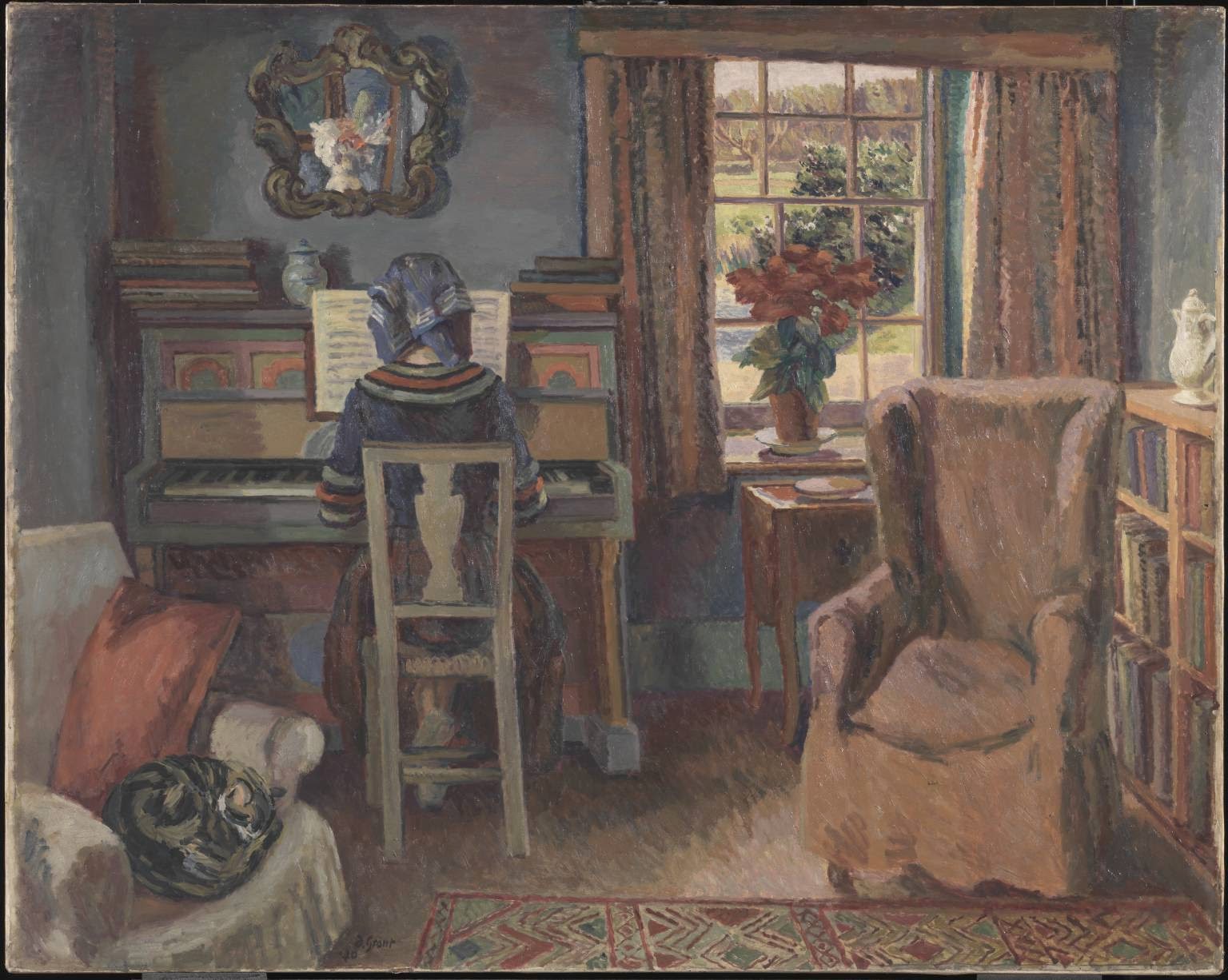I do not believe that art is life or that life is art. But they do at times suddenly intersect. The following poem is one of my favorite poems. Apart from loving it for its beauty, I had blithely and arrogantly convinced myself that I had taken its lesson to heart. As it turns out, I knew nothing, absolutely nothing. And now I have lived it.
A slumber did my spirit seal;
I had no human fears:
She seemed a thing that could not feel
The touch of earthly years.
No motion has she now, no force;
She neither hears nor sees;
Rolled round in earth's diurnal course,
With rocks, and stones, and trees.
William Wordsworth, Lyrical Ballads, with Other Poems (1800).
Duncan Grant, "Window, South of France" (1928)
The third line of the final stanza of Walter de la Mare's "Fare Well" seems to be a direct echo of the first line of Wordsworth's poem.
Look thy last on all things lovely,
Every hour. Let no night
Seal thy sense in deathly slumber
Till to delight
Thou have paid thy utmost blessing;
Since that all things thou wouldst praise
Beauty took from those who loved them
In other days.
Walter de la Mare, Motley and Other Poems (1918).
Paying attention -- paying loving attention -- is a duty we owe to the sad and beautiful world and to those making their way through the world with us. A simple thing, one would think. One would think. But, as we all know, simple things are often easier said than done.
Duncan Grant, "Girl at the Piano" (1940)
Ezra Pound seems a world away from William Wordsworth and Walter de la Mare, but he had his moments. He wrote the following untitled poem in his younger years, before he embarked on the mad project of The Cantos.
And the days are not full enough
And the nights are not full enough
And life slips by like a field mouse
Not shaking the grass.
Ezra Pound, Personae (1926).
Duncan Grant, "The Doorway" (1929)






7 comments:
Oh, dear sir, I think it the essence of the human heart that no matter how we mortals study the quotidian, never failing to note the perishable world, beauty fading even as we perceive it, the fleeting presence of those whom we love and in our fated carelessness take for granted, we will forever find that profound loss, no matter our sedulous preparation, sows only a fresh and deep sorrow, as if our grief had flowered almost overnight as the dogwoods down the way seem to have done here in the middle of March. One can study old grief, but new grief, no matter our clever sagacity, always catches us unawares. Pure sorrow is always superior to our daedal conspiring to blunt its singular agony.
Mr Pentz, a wonderful and thoughtful post. The De La Mare is lovely and the Pound surprising.
These lines of yours say it all so well.
"Paying attention -- paying loving attention -- is a duty we owe to the sad and beautiful world and to those making their way through the world with us. A simple thing, one would think. One would think. But, as we all know, simple things are often easier said than done.
Thank you.
A thoughtful post with such a moving choice of poetry.
Duncan Grant`s use of colour is so vibrant and fresh. An artist who really did reflect the joy of life in his work.
Anonymous: very well said. You are right: "new grief . . . always catches us unawares." And "pure sorrow" is always stronger than our attempts to anticipate and circumvent it beforehand. All of which makes us human, for which we should be grateful.
Thank you very much.
Mr Ashton: thank you very much for the kind words. I know that you are, like me, fond of de la Mare's poetry, so I am sure you long ago noticed the possible link between "Fare Well" and "A slumber did my spirt seal."
I agree that the Pound poem is surprising: although I am not, in general, attracted to Pound's poetry, he did write some fine short poems in his younger years, and this is one of them. This particular poem, though almost a fragment, has always made me pause, and is very lovely, I think.
As always, thank you for stopping by.
Nigel PJ: thank you very much for the kind words, and for the lovely thoughts. They are much appreciated at this time, and I will take them to heart. Thank you again.
Dartford Warbler: thank you very much for visiting again, and for your thoughts. I'm pleased you liked the post. I am trying to become more acquainted with Grant's work -- it is interesting to see him change over the years. You're right: his work always does seem to reflect "the joy of life."
Thanks again.
Post a Comment